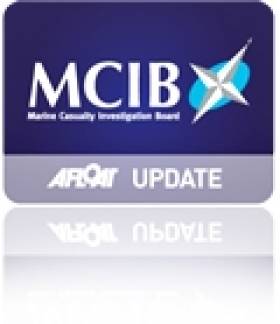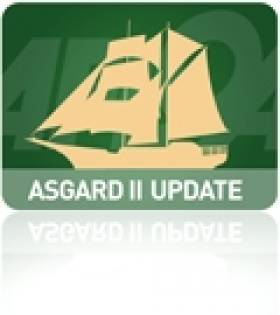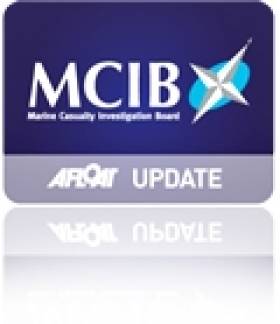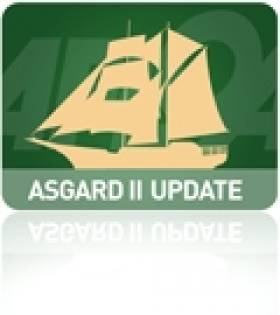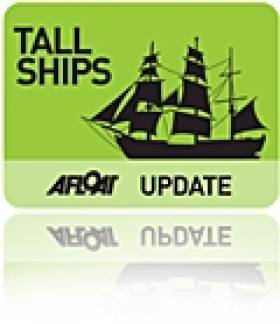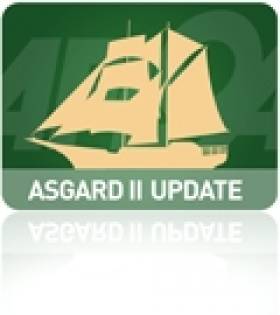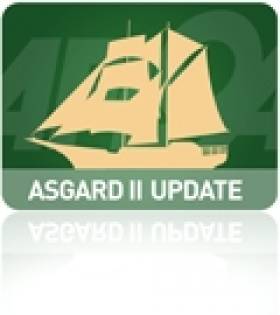Displaying items by tag: Asgard II
New Organisation Announced for Sail Training in Ireland
A sailing initiative aimed at Irish participation in next year's Tall Ships Races in Waterford has been announced by a newly formed national organisation Sail Training Ireland.
Since the sinking of the Asgard II and the decision to wind up Coiste An Asgard, the Irish Sailing Association (ISA) has been facilitating a steering group with the aim of establishing 'Sail Training Ireland'.
The steering group has been working with Sail Training International to establish a sustainable organisation that will work with training providers and host ports to build Ireland's Sail Training Programme in the future.
The Tall Ships Race that visited Belfast last year is due to return to Waterford in 2011 and Dublin in 2012 is clear recognition by the race organisers of Ireland's popularity as a destination, and a credit to the host ports who are able to facilitate such a great occasion.
The working group are preparing for the launch of Sail Training Ireland in a few weeks and are currently putting together a feasibility study and business plan for the organisation that may be presented to the Minister in the New Year.
Sail Training International has awarded a bursary to Sail Training Ireland which will provide funding to support the participation of young people in The Tall Ships Races 2011 and 2012.
"The small group that has been working on this will put together a sensible, practical but ambitious plan to ensure the legacy of Coiste an Asgard...." explains Nigel Rowe, Chairman of Sail Training International, "....it will enable Irish youth to continue to benefit from the sail training experience".
Sheila Tyrrell, Chair of the steering group, who has a long history with sail training and in particular the Asgard remarks "The bursary from Sail Training International is very welcome and endorses the credibility of our plans to re-establish a national sail training programme. The steering group will be in a position to effect the launch of Sail Training Ireland this side of Christmas."
Looking for further reading on Tall Ships in Ireland? Click the links below:
Click this link to read all our Tall Ships Stories on one handy page
Previewing Ireland's Tall Ships 2011 Season
Can Ireland Get a New Tall Ship?
New Asgard Wreck Photos Released
After the publication of the MCIB investigation report into the sinking of Asgard II the dive team lead by Eoin McGarry have released further photos of the wreck, showing different aspects of the boat including new shots of the hole in the hull.
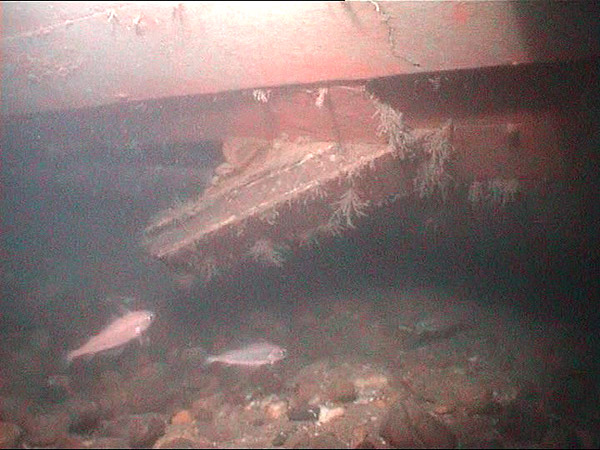
The "hole" in Asgard's Hull as it looked in July 2010 on the starboard bow, the long plank that was in the MCIB report pictures has fallen down and can no longer be seen. The view of the hole is harder to get now as the hull is listed to starboard and the seabed is silting up on the starboard bow and scouring on the port aft quarter and stern

The salvage pump used. It is located midships on the starboard side

A selection of nautical reading material still remarkably intact. The photo of the bookshelf is taken in the absence of the roof/deck of the navigation room. This is directly forward of the helm, the door out of the navigation room was just to the left of the books as you look at them
High Praise for Captain and Crew of 'Asgard II'
The impact assumption and liferaft issue in the report are already issues known about for some time.
The vessel which sank in the Bay of Biscay on 11 September 2008 while on route to La Rochelle, France was carrying 5 crew and 20 trainees.
All on board were evacuated safely from the vessel and transferred to the ships life rafts where they were brought to the island of Bel Ille by the French coastguard.
Minister or Defence, Mr. Tony Killeen commented that while the findings into the cause of the sinking are inconclusive it recognises that the vessel was equipped and maintained in excess of the statutory requirements and that higher safety standards were in place on the ship which were above those required by legislation.
The Minister also noted that the report acknowledges the leadership shown by the ship's Master, Colm Newport and he commended his and the crew's handling of the emergency situation.
The full report is available for download below.
Raise the Asgard - Afloat's 2008 online petitionCollision with Submerged Container Most Likely Cause of Asgard II Sinking - Report
On 10th September 2008 the STV "Asgard II" departed Dournenez, France bound for La Rochelle, France with 5 crew and 20 trainee crew onboard. At approximately 01:00 hrs GMT on 11th September 2008 when off St. Nazaire in the Bay of Biscay water ingress was observed in the Trainee Mess. At 01:05 hrs a Pan Pan message was broadcast. At about 01:15 hrs a Mayday Relay message was received by French Search and Rescue (French SAR) as the water in the Trainee Mess continued rising rapidly. The crew attempted to pump the flood water without success.
The ship was abandoned by liferaft at approximately 01:50 hrs. Two French lifeboats rescued all 25 persons from the liferafts.
During the abandonment the floor of one of the three liferafts launched failed and the persons onboard were successfully transferred to the other liferafts. No loss of life occurred and there were no injuries reported.
Raise the Asgard - Afloat's 2008 online petitionReport into Asgard II Sinking Due Tomorrow
On 10th September 2008 the STV "Asgard II" departed Dournenez, France bound for La Rochelle, France with 5 crew and 20 trainee crew onboard. At approximately 01:00 hrs GMT on 11th September 2008 when off St. Nazaire in the Bay of Biscay water ingress was observed in the Trainee Mess. At 01:05 hrs a Pan Pan message was broadcast. At about 01:15 hrs a Mayday Relay message was received by French Search and Rescue (French SAR) as the water in the Trainee Mess continued rising rapidly. The crew attempted to pump the flood water without success.
The ship was abandoned by liferaft at approximately 01:50 hrs. Two French lifeboats rescued all 25 persons from the liferafts.
During the abandonment the floor of one of the three liferafts launched failed and the persons onboard were successfully transferred to the other liferafts. No loss of life occurred and there were no injuries reported.
Asgard II Accident Report Due in Two Weeks
The Marine Casualty Investigation Board (MCIB) report of the investigation in to the sinking of Asgard II will be published in the next two weeks, two years after the ship sank off the French coast. The Irish Times has more HERE.
Raise the Asgard - Afloat's 2008 online petitionSetting Sails for Waterford's Tall Ships Race
The four-day maritime spectacle expects to attract 500,000 visitors to throng the quays of the 'Crystal' city. Presented by Szczecin and organised by Sail Training International, the prestigious event is supported through host-port partners, 3, Bulmers Original Irish Cider and Waterford Crystal. In addition the host-port educational partner is Waterford Institute of Technology and the official media partner covering the event is RTE. Between them over €450,000 has been raised to support funding.
Waterford City Council and the Port of Waterford are providing leading roles as delivering agencies having jointly mounted the bid to secure staging the Tall Ships Races return following the city's successful hosting of the event in 2005.
Notably in that year's 'Parade of Sail' the procession was led by Asgard II, followed astern by Jeanie Johnston and Dunbrody. The involvement of all Irish tall-ships was an historical occasion particularly in view of the sinking of Asgard II three years later.
In 2005, Waterford also claimed to be the first Irish host port to be the starting port for the race and this will be repeated in 2011.
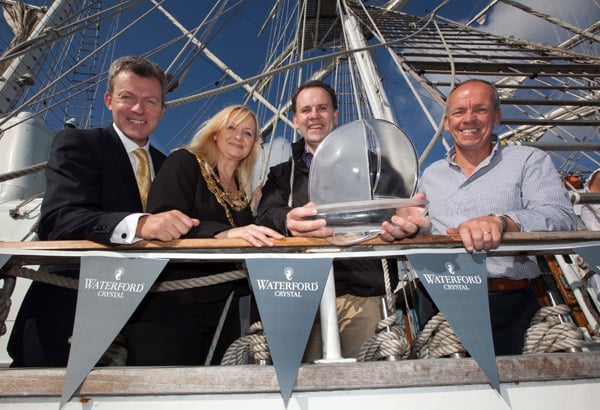
Gary Breen, Failte Ireland; Cllr Mary Roche,Mayor of Waterford,David McCoy, House of Waterford Crystal and Des Whelan, Chairman, The Tall Ships Races 2011 onboard the 'Lord Nelson' in Waterford. Photo: Dylan Vaughan
At the reception onboard Lord Nelson, Cllr Mary Roche, Mayor of Waterford said: "To 3,Bulmers,RTE, Waterford Crystal and Waterford Institute of Technology, I say a very sincere thank you on behalf of the people of Waterford and all of those around Europe and beyond who will be here next summer for what promises to be four magical days of free fun in Ireland's oldest city".
Next year's hosting is also to be supported by Failte Ireland which is allocating resources of €3m while Tourism Ireland will embark on an intensive marketing campaign during the mid summer event, which is billed to be the biggest event in Ireland.
There will be between 80-100 tall-ships and their international crews converging in Waterford. Among the vessels confirmed is the 1937-built, Christian Radich which starred in the 1958 film, The Windjammer and also featured in the 1970's television series, The Onedin Line.
Incidentally the Christian Radich was used, albeit with limited trainee spaces allocated to Coist an Asgard in an arrangement with the vessel's Norwegian owners in 2009, the first full year of the national sail training programme since the sinking of Asgard II the previous year.
The staging costs of the 2011 Tall Ships is estimated at €3.5m and is expected to generate €35m to Waterford City and hinterland. The organisers of the event will be embracing social technology communications networks with presentations on Facebook, Twitter and other servers.
Last year Belfast held the honour in welcoming the finale of the Tall Ship Races, incorporating the Tall Ships Atlantic Challenge. Dublin hosted the event in 1998, albeit the race was then known as the Cutty Sark Tall Ships Race with this same title applying to the race when the event visited Cork Harbour in 1991.
Looking for further reading on Tall Ships in Ireland? Click the links below:
Click this link to read all our Tall Ships Stories on one handy page
Previewing Ireland's Tall Ships 2011 Season
Can Ireland Get a New Tall Ship?
Asgard Artifacts Welcomed Back to Ireland
Artifacts recovered from the wreck of Asgard II some 20 miles off the French coast last week were welcomed home in Ireland last night by campaigners who wants to see the national sail training programme reinstated.
Dive leader Eoin McGarry from Waterford said he had brought the ships wheel, a compass and the ships bell back for the Irish nation. "Coiste an Asgard will probably get them but I hope that in time they will be given to the National Maritime Museum." he said.
McGarry and his team also took extensive photographic stills and video footage of the wreck.
Since Asgard II sank in September 2008 the national sail training programme has been shelved.
Our photos over the fold show (left) Sail training campaigner Captain Gerry Burns and Eoin McGarry with the Asgard artifacts in Waterford.
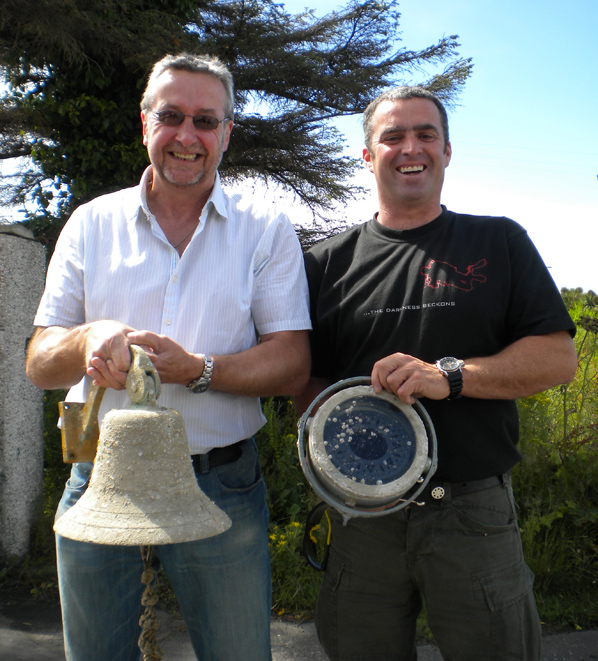
Asgard Divers Spark Salvage Controversy (w/ Podcast)
A team of divers, including a member of the Garda Siochana, who removed items from the wreck of the Asgard II have become embroiled in a maritime law controversy.
The team faced questioning by French police yesterday and may also have questions asked by the Minister for Defence, Tony Killeen.
Minister for Defence Tony Killeen was quoted in an Irish Times article as saying that he could “find no evidence at this stage that permission for the dive had been granted by either the Irish or French authorities”.
Mr Killeen said that the issue was one for Coiste an Asgard, the body that administered the national sail training scheme while the Asgard II was afloat, and that is due to be closed down according with budgetary recommendations.
The team of divers, led by recovered the steering wheel, ship’s bell and compass from the Asgard II, saying that they wished to retain the artefacts for the National Maritime Museum in Dun Laoghaire, and said that had they not reclaimed the items, other sport divers would have.
The items, once brought back to Ireland, must now be deposited with the Receiver of Wrecks in the Revenue Commissioners so that the owners of the wreck, Coiste an Asgard, can have a say as to what happens the items.
Capt Gerry Burns, a former master of the Asgard II who secured sponsorship for the diving expedition, defended the venture and said that the artefacts would be offered to the National Maritime Museum.
“The Government doesn’t care about sail training, so what harm were we doing?”asked Capt Burns.
The dive took place in 83 metres of water, more than 250 feet, making it a challenging and technical dive. Eoin McGarry of Co Waterford led the dive. One of Ireland's most accomplished divers, he was part of a team that explored the wreck of the Lusitania in September 2008.
Mr McGarry was quoted as saying: “The ship is still upright but listing to starboard".
“Unfortunately, it is not in a salvageable condition now as the wheelhouse and mast were ripped away by trawling activity, but the hull is intact and we have images of the hole which we believe led to the sinking,”he said, adding that he was disappointed that Coiste an Asgard had filed a complaint.
Below is a podcast recorded with diver Eoin McGarry about their dive on the Asgard, and also a Vogue feature on Eoin's dive on the Lusitania.



























